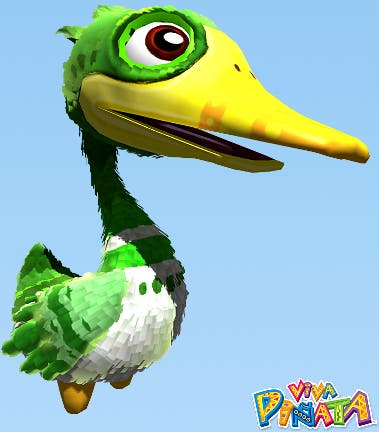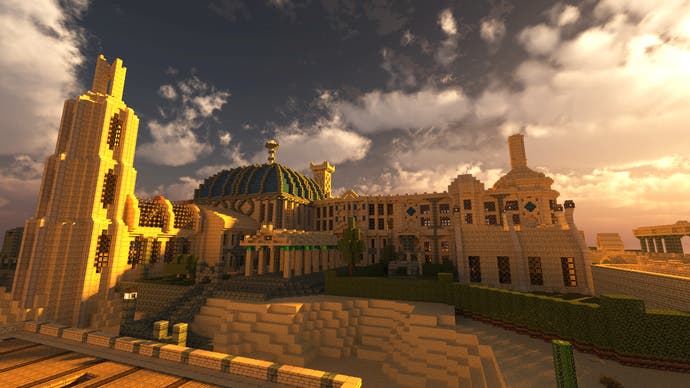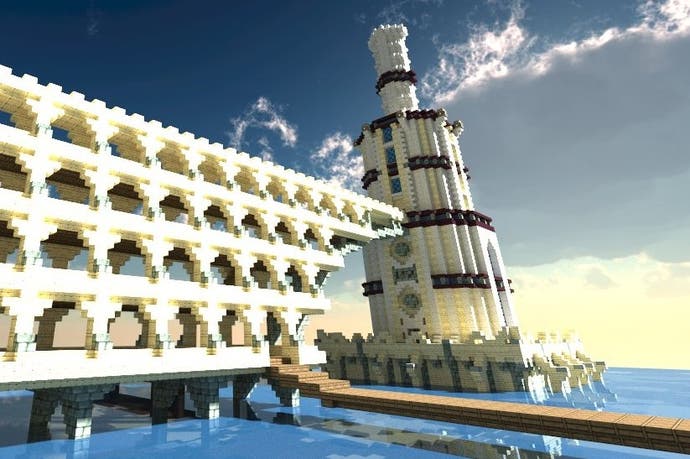Sorry, Microsoft, but you can't own Minecraft
It's a force of nature.
Microsoft might be about to buy Mojang, which means, I guess, that Microsoft might be about to buy Minecraft. Let's think about that for a second. No, let's laugh about that for a second. Imagine! Imagine realising that you could buy Minecraft and believing, by extension, that you could somehow own Minecraft.
That's not to say there aren't very good reasons for wanting to merely buy Minecraft, of course. This thing's sold around 50 million copies so far, and it's still in the charts doing well. A cut of that sort of action would be pretty nice, as would a cut of the merchandising empire that's grown up around Minecraft - the books, the T-shirts, the toys. Minecraft: The Movie - would people go for that? Could we get Ridley or Steven involved? Bear in mind, too, that the kind of people who are always itching to get Ridley or Steven involved are probably also the kind of people who increasingly worry that they will never truly understand what the kids might actually like these days anyway. Why not circumvent the entire headache of empathy and market research by just buying something you know the kids already like? Why not do all this and benefit from the good will that Minecraft brings with it while you're at it? The way Minecraft's synonymous with creativity and generosity and all the things that don't come to mind when you're opening MS Office at 9am on a Monday. The way a single screenshot, deployed at the right time - maybe 9am on a Monday? - can brighten your entire day.
And while we're on this, that's not to say there aren't very good reasons for hoping Microsoft doesn't buy Minecraft, either. I personally think Microsoft's capable of pretty delicate behaviour given the size of its operation, but that size-of-its-operation part is still a serious caveat. Like many mega corps, behind the desperate conversationalisation of public discourse, Microsoft can sometimes seem a little tone deaf to humanity. It's weird to think that the stewardship of the world's most human game could be headed to Redmond, to the people who signed off those Honestly adverts, to the people with Windows 8 and Kinect on their consciences. Then there's the Minecraft that's platform agnostic, running on iOS, on Android, on PlayStation. Surely Microsoft wouldn't do anything about the versions that are already out there. Would they? But what about the platforms of the future? What about the business model? What about the ethos behind the whole thing? Is somebody, somewhere, typing the phrase 'Minecraft 2' onto their Surface Pro non-ironically, and creating a mind map? Are they getting giddy and thinking, 'Man, we could ship this?'
Let's forget all that, though, at least for the duration of this article. Instead, let's return to the fact that you simply can't own Minecraft. Nobody can. It's a bit of a puzzle, in fact. Minecraft's simultaneously the least ownable game ever created - a thing that so clearly belongs to the world, like Monet, or cholera - and a game that everybody already thinks that they, personally, have a highly specialised stake in. This is why Minecraft's so peculiar, so vital, so eternally relevant. It's also why actually being technically in charge of it is probably a complete nightmare, albeit a very plush one - but we'll get to that in a moment.
So: can you ever really own a game once it's become popular? Sure. You can own Halo, where the lore is Midichlorian-strength neurobabble and the protagonist looks like luggage. Keeping it in-house, you can own something like Viva Pinata, even, which, while playful and expressive and personable, still feels like it took an educational psychologist to the face at 100mph and never quite recovered.
These are wonderful games, and I'm already sorry about the whole luggage thing, but you can own them, I suspect, because you can readily agree on what they are, even if they're really uncommonly good at what they then do. Halo is comics and action figures and T-shirts and hardback books riddled with lore that's probably hard to spell-check effectively, but it's ultimately about those encounters - the smack to the head, the grenade lofted into the rabble, the mopping up of the stragglers. Viva Pinata is Saturday morning cartoons and duvet sets and breakfast cereals (in some alternate universe it is anyway) but it's ultimately pets and recipes and knotty, tooth-and-claw choices regarding who gets hit with a shovel.
Minecraft? What's Minecraft? There's a problem with answering that question, I suspect, and the problem, for me, can be summed up in a single word: Whiteark.

Whiteark, or Wy'Taracck, Determined Sentinel of the East, is a desert city with some astonishing domed and buttressed architecture on display, and it's been built by a single person. It's in Minecraft - that single person bit was probably a giveaway - and when I stare at the screenshots of it, it looks like nothing so much as a hallucination from the very dead of night, in the absolute middle of winter, that's somehow crossed over and firmed itself up.
It's also a doodle that got seriously out of hand. According to its designer, it started as a little village project initiated a few days before Halloween, 2012, and yet it now encompasses 1057x824 blocks at its widest point. It's so intricate and coherent, and yet it's only been haphazardly planned. You know how you'll be driving along the road and you'll see birds flocking in lazy circles overhead and then remember that you read an article once that pointed out no single bird is ever in charge? Whiteark.
Man, Whiteark is weird. It has museums and public squares and a Palace of the Oases, but it has no people. It owes an obvious debt to the kind of cursed cyclopean architecture Lovecraft could never seem to dispel over a morning coffee, yet it also reminds me of the ultimate folly/calling card of any up-and-coming renaissance busybody: a utopian city project designed along very personal lines. Even with these reference points, there's never been anything quite like Whiteark. It feels like something new, an experiment in open-ended storytelling through the creation of the geography that supports it. It feels like world-building where the lore emerges through the placement of stones. And it serves as a reminder that there's never really been anything quite like the game it sits within. You can play this game as a survival horror if you want. You can play it as an RPG or a nature ramble. Or you can do this, and there are ultimately no words for what this even is.
Most of us can't go to Whiteark just yet, but at least we know it's out there. (Or in there?) Who knows what things lurk on other private servers? I'm guessing, at a pinch, that the answer's: everything. Minecraft's an attic, a therapist, a rollercoaster, a chat room, a boot sale, a place to vent when faced with the many frustrations of life. Have you seriously never built a mountain of TNT in Minecraft and set it off just because an email exchange didn't go your way, or because you got gazumped on eBay while browsing for a pristine copy of Hero Quest? And yet! And yet Minecraft pretty much sings when you stick it in a classroom, too. It has something to show you wherever you put it, in fact, because the things it shows you are things it first draws out of you. It's a hobby project that's changed the industry completely and irrevocably, locating and shoring up a generation of players who don't need - who don't even want - a game to be finished before they start to mess with it.

It's telling, I think, that the only thing that diminishes the glorious, frightening strangeness of Whiteark for me is reading that the creator plans on eventually turning it into an RPG. That tames it somewhat, nudging it back into the spheres of Master Chief or the Quackberries. It's like hearing the god of the Old Testament originally earmarked the Ark of the Covenant as a place to store his bowling trophies. Maybe I'm just being a jerk, but it's a natural reaction to the news. Whiteark's so singular, so mysterious, that I can't help but feel I have a stake in it, even though I've never been there and I will probably never go, even though my only connection to it is that I read about it in a Kotaku article.
And that brings us back to the flipside of the ownership coin, the question of whether Minecraft's ultimately that much fun to be responsible for anyway. (Aside from the millions and millions of pounds it rakes in, obviously.) Here's Notch himself in an oft-quoted tweet from 17 June this year:
"Anyone want to buy my share of Mojang so I can move on with my life? Getting hate for trying to do the right thing is not my gig."
I don't know Notch at all, but he seems like a thoughtful, interesting, and surprisingly level-headed man. Any hate he's getting, I suspect, is because he's created something that means very different things to each of its millions of players - every one of which now wants him to service the unique game that they have spent so much time bringing to life.
So, really, even the man who's selling Minecraft, even the man who hacked it into existence and set it moving, doesn't really seem to actually own it. What hope is there for anyone else?


